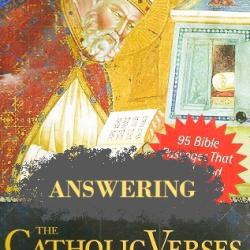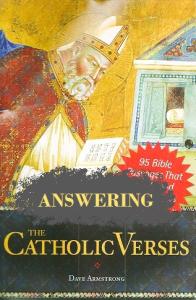
I will be resolving all of the alleged “contradictions” from the web page entitled “194 CONTRADICTIONS, New Testament.” It’s perpetually striking to observe how many of these are obviously not logical contradictions, and how very easy they are to refute (many being patently and evidently absurd). A few here and there do seem to be genuinely perplexing (at first glance) and require at least some thought and study and serious examination (they save my patience). But all are ultimately able to be (in my humble opinion) decisively resolved. Readers can decide whether I succeed in my task or not, in any given case. My biblical citations are from RSV. The words from the web page above will be in blue.
See further installments:
Refutation of 194 Biblical “Contradictions” (#1-25) [4-5-22]
Refutation of 194 Biblical “Contradictions” (#51-75) [4-7-22]
Refutation of 194 Biblical “Contradictions” (#76-100) [4-8-22]
Refutation of 194 Biblical “Contradictions” (#101-125) [4-8-22]
Refutation of 194 Biblical “Contradictions” (#126-150) [4-9-22]
Refutation of 194 Biblical “Contradictions” (#151-175) [4-11-22]
Refutation of 194 Biblical “Contradictions” (#176-194) [4-11-22]
*****
26) The centurion’s servant was healed in between the cleansing of the leper and the healing of Peter’s mother-in-law. Mt.8:2-15.
The centurion’s servant was healed after the cleansing of the leper and the healing of Peter’s mother-in-law. Lu.4:38,39; 5:12,13; 7:1-10.
As I discussed last time: the StackExchange website has a page called “When was Peter’s mother-in-law healed? Chronological contradiction?” An excellent answer was provided (posted on 12 April 2021):
My own study of the argument from order has led me to four conclusions . . .:
- None of the Synoptic authors were trying to present the material in a strictly chronological sequence
- Matthew principally organizes his Gospel by topic (like an encyclopedia)
- Luke principally organizes his Gospel by geography (like an atlas)
- Mark borrows from Matthew & Luke, sometimes following the order of one and sometimes the other (like somebody telling stories from memory) . . .
If we expect the Gospel authors to write in a 21st century style, we will be disappointed. They were not trying to present a day-by-day travel log, but a collection (from what must have been a much larger pool of material) of the teachings and sayings of Jesus they believed were most important for the audiences they had in mind . . .
The Synoptic Gospels do not present their material in the same order, because the authors never intended them to do so. [italics added]
27) The people were not impressed with the feeding of the multitude. Mk.6:52.
The people were very impressed with the feeding of the multitude. Jn.6:14.
It’s not “the people” referred to in Mark, but rather, the disciples (see 6:45, 51-52). They didn’t grasp the miracle of loaves and fish because “their hearts were hardened” (6:52). But John 6:14 refers to the crowds (“the people”) being impressed. Therefore, because it’s two different sets of people being referred to in these two passages, there is no contradiction. One wonders (after a ludicrous example like this) whether these Bible skeptics even read the passages they rush to use in these warmed-over lists of supposed “contradictions” that they churn out . . .
28) After the feeding of the multitude, Jesus went to Gennesaret. Mk.6:53.
After the feeding of the multitude, Jesus went to Capernaum. Jn.6:14-17.
Gennesaret is a plain on the western shore of the Sea of Galilee, between Capernaum to the north and Magdala to the south. Both Mark 6 and John 6 refer to the feeding of the 5,000. In Mark’s account, Jesus and the disciples “moored to the shore” (Mk 6:53) at Gennesaret. John 6:14-17, oddly enough, never states that Jesus went to Capernaum. It says that the “disciples . . . started across the sea to Caper’na-um” (6:16-17). Jesus was walking on the water (6:19), got into the boat with them (6:21), and “immediately the boat was at the land to which they were going” (6:21).
But it doesn’t say exactly where they landed, as in Mark. I think it’s plausible to hold that the strong winds and their being “beaten by waves” (Mt 14:24; cf. Mk 6:48; Jn 6:18) blew them off course a bit, so that they landed at Gennesaret, some three miles south of Capernaum (consistent with Mark’s report). In any event, John 6 doesn’t inform us that “Jesus went to Capernaum”. It says that the crowds sought Jesus in Capernaum (6:24) but that He wasn’t there. He was “on the other side of the sea” (6:25). Of course, He could have gone from Gennesaret to Capernaum at some undisclosed later point in time after they landed in the former plain, and John 6:59 says He was there, at the synagogue.
The parallel account in Matthew (14:22-34) verifies Mark’s specific report of the boat landing. It was windy, Jesus walked on the water (so did Peter, for a short time), they both got into the boat, which “came to land at Gennesaret” (14:34). If two sources agree on all these details and both say “the boat landed at location X” and a third agrees with them about almost all details, except the exact (unspecified) landing location, it is perfectly sensible to assume that the boat did indeed land at location X. To deny it based on the third source is merely the ineffectual argument from silence again.
In any event, I see no contradiction here whatsoever. Whoever came up with this “contradiction” didn’t read the texts very carefully. Foiled again!
29) A demon cries out that Jesus is the Holy One of God. Mk.1:23,24.
Everyone who confesses that Jesus came in the flesh is of God. 1 Jn.4:2.
This is at least a clever and understandable one, that is worthy of an explanation. What 1 John says is generally true. He speaks mostly proverbially: meaning that it expresses general truths, that sometimes have exceptions (just as we see in the book of Proverbs). For example, he states:
1 John 3:6-9 No one who abides in him sins; no one who sins has either seen him or known him. [7] Little children, let no one deceive you. He who does right is righteous, as he is righteous. [8] He who commits sin is of the devil; for the devil has sinned from the beginning. The reason the Son of God appeared was to destroy the works of the devil. [9] No one born of God commits sin; for God’s nature abides in him, and he cannot sin because he is born of God.
These are all proverbial and idealistic truths: “textbook” examples. What he means is that “the good, serious Christian is typified or characterized by the absence of sin, and this is the high goal of the Christian life.” But we can’t possibly interpret all of these passages absolutely literally, because we know that even very good Christians are imperfect and sin, and it doesn’t follow that it makes them automatically “of the devil” (3:8). John knows this, too, because he writes elsewhere in his epistle:
1 John 1:8-10 If we say we have no sin, we deceive ourselves, and the truth is not in us. [9] If we confess our sins, he is faithful and just, and will forgive our sins and cleanse us from all unrighteousness. [10] If we say we have not sinned, we make him a liar, and his word is not in us.
1 John 2:1-2 My little children, I am writing this to you so that you may not sin [the high ideal]; but if any one does sin [the frequent sad reality], we have an advocate with the Father, Jesus Christ the righteous; [2] and he is the expiation for our sins, and not for ours only but also for the sins of the whole world.
Moreover, and directly to the present point, Jesus said:
Matthew 7:15-23 “Beware of false prophets, who come to you in sheep’s clothing but inwardly are ravenous wolves. [16] You will know them by their fruits. Are grapes gathered from thorns, or figs from thistles? [17] So, every sound tree bears good fruit, but the bad tree bears evil fruit. [18] A sound tree cannot bear evil fruit, nor can a bad tree bear good fruit. [19] Every tree that does not bear good fruit is cut down and thrown into the fire. [20] Thus you will know them by their fruits. [21] “Not every one who says to me, ‘Lord, Lord,’ shall enter the kingdom of heaven, but he who does the will of my Father who is in heaven. [22] On that day many will say to me, ‘Lord, Lord, did we not prophesy in your name, and cast out demons in your name, and do many mighty works in your name?’ [23] And then will I declare to them, ‘I never knew you; depart from me, you evildoers.’
And so, in light of this, even a demon can and does state, “I know who you are, the Holy One of God” (Mk 1:24). It doesn’t follow, however, that it is a follower of Jesus. Words alone (even if true) mean little unless they are backed up by action, and demons do nothing good. It’s for this reason that Jesus rebuked the demon who said these things, by saying, “Be silent, and come out of him!” (Mk 1:25). The demon was probably expressing the truth in a mocking, blasphemous manner in the first place (as they are known to habitually do). We don’t get the tone of voice and inflection in the written words of Scripture.
30) Jesus cursed the fig tree so that it would not bear fruit. Mt.21:19; Mk.11:14.
It wasn’t time for the fig tree to bear fruit. Mk.11:13.
To note that it wasn’t the season for figs (Mk 1:13) is different from Jesus saying “May no fruit ever come from you again!” (Mt 21:19) and “May no one ever eat fruit from you again” (Mk 11:14); therefore, this is no contradiction.
31) The fig tree withers immediately, and the disciples are amazed. Mt.21:19,20.
The disciples first notice the withered tree the next day. Mk.11:20,21.
Apologetics Press offers one of their always-superb rebuttals:
The fact of the matter is, the gospel writers never claimed to have recorded all of the events of Jesus’ life in the exact order in which they occurred. Unless an action or event is denoted by a specific marker (such as “the next day,” “ on the morrow,” “on the Sabbath,” etc.), there can be time gaps between the verses. . . .
In Mark, the Lord cursed the fig tree, but the account does not say when it withered. The disciples saw it withered the next day, and Peter remembered what the Lord had said. Matthew’s account says that the Lord cursed the tree, and it withered immediately, but it does not say when the disciples saw it. Matthew 21:20 merely says “And when the disciples saw it…,” with no regard to the exact time. . . . The verse in Matthew provides no time span between when it withered and when the disciples noticed.
However, Mark 11:12,19-20 does give the exact span of time between the curse and the time the disciples noticed it—one day. Since the gospels do not claim to be in exact chronological order, both Matthew and Mark offer a portion of the story. The best thing to do is to extrapolate—from both passages—exactly what happened. Both Mark 11:12 and Matthew 21:18 record that Jesus was hungry, and both recount how He approached a fig tree and, finding no figs, cursed it. Matthew then records that it withered immediately (21:19), and Mark records that the disciples heard Jesus curse the tree, but he does not say whether or not they noticed the tree withered at that time (11:14). Mark then continues the narrative of Jesus cleansing the temple in Jerusalem (11:15-19). Both writers then recount the astonishment of the disciples at seeing the fig tree withered, with Mark designating it as the next day (11:20-21) and Matthew not specifying how much time passed between 21:19 and 21:20. (26 May 2004)
32) Jesus is the mediator of the “Father”. 1 Tim.2:5; 1 Jn.2:1.
Jesus sits on “his” right hand. Mk. 16:19.
I’m afraid I don’t have the slightest idea what is thought to be contradictory here. If I did, I would offer some sort of resolution. There is no conflict here that I can discern.
33) There is one “God”. 1 Tim.2:5; Jms.2:19.
There are three. 1 Jn.5:7.
Indeed, there is one God. The “traditional” 1 John 5:7 is a verse that isn’t in the earliest manuscripts, so those who place a high priority on accurate manuscripts say that it’s simply not part of the biblical canon (therefore, not inspired). But let’s accept the view that it is in the Bible for the sake of argument. Here is the KJV version of the disputed verse:
1 John 5:7 (KJV) For there are three that bear record in heaven, the Father, the Word, and the Holy Ghost: and these three are one.
This doesn’t state that there are three gods. It says that there are three [implied, Persons] and that “these three are one” [implied, God]. The Holy Trinity is the belief that the one God subsists in three persons (trinitarian monotheism), not that there are three gods (tri-theism).
For hundreds of biblical arguments for the Holy Trinity, see my papers:
Jesus is God: Hundreds of Biblical Proofs (RSV edition) [1982; rev. 2012]
Holy Trinity: Hundreds of Biblical Proofs (RSV edition) [1982; rev. 2012]
34) Jesus said to honor your father and mother. Mt.15:4; Mt.19:19; Mk.7:10; Mk.10:19; Lk.18:20.
Jesus said that he came to set people against their parents. Mt.10:35-37; Lk.12:51-53; Lk.14:26.
Jesus said to call no man father. Mt.23:9.
I’ve dealt with the falsely alleged “contradiction” between the first two propositions above:
Dr. David Madison vs. Jesus #1: Hating One’s Family? [8-1-19]
Madison vs. Jesus #5: Cultlike Forsaking of Family? [8-5-19]
Did Jesus Teach His Disciples to Hate Their Families? [National Catholic Register, 8-17-19]
And I have disposed of the notorious “call no man father” issue:
Biblical Evidence Regarding Calling Priests “Father” [2-24-16]
35) Jesus/God said, “You fool…”. Lk.12:20; Mt.23:17.
Paul calls people fools. 1 Cor.15:36.
Call someone a fool and you go to hell. Mt.5:22.
I’ve already addressed this issue as well:
Did Paul and Peter Disobey Jesus and Risk Hellfire (Calling Folks “Fools”)? Did Jesus Contradict Himself? Or Do Proverbs and Hyperbolic Utterances Allow Exceptions? [2-5-14]
On [Not?] Calling People “Fools”: Biblical Reflections [10-13-17]
36) Anger by itself is a sin. Mt.5:22.
But not necessarily. Eph.4:26.
Matthew 5:22 is a proverbial-type utterances, which by nature allows of exceptions. The exception is precisely shown in Ephesians 4:26: “Be angry but do not sin; do not let the sun go down on your anger,”. If it’s possible to be angry without sin, as this passage proves, then we can’t possibly make a blanket statement that all anger is sin, period. Matthew is not asserting that because Jesus is uttering a proverb. But Paul in Ephesians is being literal. Therefore, no contradiction is in play. Keep trying, guys! Give it the ol’ college try . . .
37) Ask and it shall be given. Seek and you will find. Knock and it will be opened to you. Mt.7:7,8; Lk.11:9,10.
Ask and you shall be refused. Seek and you won’t find. Knock and you will be refused entrance. Lk.13:24-27.
The first statement provides utterances from Jesus that are general, proverbial truths, that are qualified elsewhere in Scripture, in literal passages. For example: “You ask and do not receive, because you ask wrongly, to spend it on your passions” (Jas 4:3); “if we ask anything according to his will he hears us” (1 Jn 5:14).
Luke 13:24-27 is very different, and is specifically about those who are reprobate or damned. They had every chance to repent during their lives and be saved, but now it is too late; it’s time to be judged; so at that point they can’t seek any more; “the game’s up.”
No conflict here. It’s apples and oranges again.
38) Do not judge. Mt.7:1,2.
Unless it is necessary, of course. 1 Jn.4:1-3.
Again, we have the proverbial statement, that allows exceptions, in Matthew 7:1-2. Matthew’s expressing a sort of “reverse golden rule.” If we judge harshly, unfairly, uncharitably, then chances are such judgment will come back to us at some point. It doesn’t follow that no one can ever rightly judge, ever. 1 John 4:1-3 is actually about spiritual discernment, so it’s a non sequitur and no contradiction by the same token. But there are many verses about rightful, non-sinful judging:
Luke 11:19 And if I cast out demons by Be-el’zebul, by whom do your sons cast them out? Therefore they shall be your judges.
Luke 11:31-32 The queen of the South will arise at the judgment with the men of this generation and condemn them; for she came from the ends of the earth to hear the wisdom of Solomon, and behold, something greater than Solomon is here. [32] The men of Nin’eveh will arise at the judgment with this generation and condemn it; for they repented at the preaching of Jonah, and behold, something greater than Jonah is here.
Luke 12:57 And why do you not judge for yourselves what is right?
Luke 22:30 that you may eat and drink at my table in my kingdom, and sit on thrones judging the twelve tribes of Israel.
John 7:24 Do not judge by appearances, but judge with right judgment.
1 Corinthians 10:15 I speak as to sensible men; judge for yourselves what I say.
1 Corinthians 11:13 Judge for yourselves; . . .
39) Jesus is thankful that some things are hidden. Mt.11:25; Mk.4:11,12.
Jesus said that all things should be made known. Mk.4:22.
In Matthew 11:25 Jesus states: “”I thank thee, Father, Lord of heaven and earth, that thou hast hidden these things from the wise and understanding and revealed them to babes;”. Mark 4:11-12 is about Jesus’ use of parables. He deliberately used them, knowing that those who don’t want to know the truth won’t grasp them. The He sarcastically decries the notion of their freely chosen obstinacy: “that they may indeed see but not perceive, and may indeed hear but not understand; lest they should turn again, and be forgiven” (Mk 4:12).
In Mark 4:22 Jesus teaches that the state of affairs just described will not be permanent; that one day “there is nothing hid, except to be made manifest; nor is anything secret, except to come to light.” Thus a temporary, limited “hiddenness” isn’t contrary to the idea that things won’t always be this way.
40) Jesus said that no sign would be given. Mk.8:12.
Jesus said that no sign would be given except for that of Jonas. Mt.12:39; Lk.11:29.
Jesus showed many signs. Jn.20:30; Acts 2:22.
The difference (not a contradiction) has to do with willingness to believe vs. unwillingness. Jesus knew who would accept His signs and miracles and who would not. With people who did not and would not (usually the “scribes and Pharisees”), He refused to do miracles and signs. This is made clear in the Bible:
Mark 8:11-12 The Pharisees came and began to argue with him, seeking from him a sign from heaven, to test him. [12] And he sighed deeply in his spirit, and said, “Why does this generation seek a sign? Truly, I say to you, no sign shall be given to this generation.”
Matthew 12:39 But he answered them, “An evil and adulterous generation seeks for a sign; but no sign shall be given to it except the sign of the prophet Jonah.” (cf. 16:4)
In Jesus’ story of Lazarus and the rich man, He explains why sometimes it does no good to perform miracles:
Luke 16:27-31 And he said, `Then I beg you, father, to send him to my father’s house, [28] for I have five brothers, so that he may warn them, lest they also come into this place of torment.’ [29] But Abraham said, `They have Moses and the prophets; let them hear them.’ [30] And he said, `No, father Abraham; but if some one goes to them from the dead, they will repent.’ [31] He said to him, `If they do not hear Moses and the prophets, neither will they be convinced if some one should rise from the dead.’”
This also, of course, foretold the widespread rejection of the miracle of His own Resurrection. Belief or willingness to accept the evidence of a miracle is also tied to Jesus’ willingness to do miracles:
Matthew 13:58 And he did not do many mighty works there, because of their unbelief.
With the common folk, it was entirely different, and so we also see a verse like John 6:2 (“And a multitude followed him, because they saw the signs which he did on those who were diseased.”). Because the atheist hyper-critic refuses to acknowledge or understand these simple distinctions, all of a sudden we have yet another trumped-up, so-called contradiction where there is none at all. E for [futile] effort, though . . .
41) Jesus stated that the law was until heaven and earth ended. Mt. 5:17-19.
Jesus stated that the law was only until the time of John. Lk.16:16.
Matthew 5:17-18 Think not that I have come to abolish the law and the prophets; I have come not to abolish them but to fulfil them. [18] For truly, I say to you, till heaven and earth pass away, not an iota, not a dot, will pass from the law until all is accomplished.
Luke 16:17 But it is easier for heaven and earth to pass away, than for one dot of the law to become void.
Where’s the contradiction? This is a classic case of the skeptic not even reading the very next verse in order to grasp the proper context.
42) The “Sermon on the Mount” took place on the mountain. Mt.5:1.
The “Sermon on the Mount” took place on a plain. Lu.6:17.
Matthew 5:1-2 Seeing the crowds, he went up on the mountain, and when he sat down his disciples came to him. [2] And he opened his mouth and taught them, . . . (cf. 8:1)
Luke 6:12-13, 17 In these days he went out to the mountain to pray; and all night he continued in prayer to God. [13] And when it was day, he called his disciples, and chose from them twelve, . . . [17] And he came down with them and stood on a level place, with a great crowd of his disciples and a great multitude of people from all Judea and Jerusalem and the seacoast of Tyre and Sidon, who came to hear him and to be healed of their diseases;
Before I visited Israel in 2014, I used to say that Jesus preached from a mountain that had a flat top. Now that I have been to the place where the sermon was preached, I can report that both things are true (but in a different manner). Note that Matthew 5:1 doesn’t state “on the top of the mountain.” A little ways up from the water and base of the hill, there is a flat area. So He preached from the plain or “level place”. But it’s also “on the mount” as well (since if one is part of the way up a mountainside, we still say he is “on the mountain”). One can see a photograph confirming this in an article about the Sermon on the Mount. The general topography of the area is confirmed, for example, by the article on “Palestine” in The Encyclopaedia Britannica of 1859 (Vol. 17, p. 182):
It is one peculiarity of the Galilean hills, as distinct from those of Ephraim and Judah, that they contain or sustain green basins of table-land just below their topmost ridges. (Stanley.)
Again: Jesus didn’t preach this sermon on top of a mountain. He preached it from halfway down the mountain, with His hearers above Him, in a “natural amphitheater.” Now that I’ve seen it with my own eyes, it makes perfect sense. Sound projects upwards and is “caught” by the amphitheater shape (precisely why the ancient Greeks and others used that shape). Our guide n Israel said that he has visited the Church of the Beatitudes at night with no one around, and could clearly hear fishermen talking down by the sea.
This is confirmed also by textual evidence in the New Testament. Jesus is described at least once as being in the water and teaching from the boat (Lk 5:3). I think it’s fairly clear that He was utilizing the same acoustic principle when He did that. The Sea of Galilee is ringed by pretty high hills all the way around.
My tour group later tested the theory in a similar “amphitheater” location where Jesus fed the 4,000 (across the Sea of Galilee; on its east shore). It was absolutely correct: we could hear each other — talking fairly softly, to test it — perfectly from bottom-to-top and vice versa.
43) The “Lord’s Prayer” was taught to many during the “Sermon on the Mount”. Mt.6:9.
The “Lord’s Prayer” was taught only to the disciples at another time. Lu.11:1.
It looks like Jesus simply repeated the prayer (no law against that!): seeing what importance it would have in the history of the Church, as the collective Christian prayer: the most well-known of all. Repetition is a great teacher. In Luke, He taught it to His disciples in a shorter version. Then He expanded the prayer and taught it to the “crowds” (5:1; 7:28) in the Sermon on the Mount. None of this is implausible or unlikely to the slightest degree, and it certainly isn’t a “contradiction.”
44) Jesus had his own house. Mk.2:15.
Jesus did not have his own house. Lu.9:58.
The verse is a bit ambiguous as to whose house is referred to. Cross-reference Luke 5:29, however, in the midst of reporting the same story, asserts that it was definitely Levi‘s (i.e., Matthew’s) house: “And Levi made him a great feast in his house; and there was a large company of tax collectors and others sitting at table with them” (Lk 5:29). On the other hand, Mark 2:1 states about Jesus: “And when he returned to Caper’na-um after some days, it was reported that he was at home” (cf. Mt 9:1: “his own city.”). And Matthew 4:13 adds: “he went and dwelt in Caper’na-um.” Thus, we know that Jesus lived in Capernaum for some undetermined length of time, either in His own house or in Peter’s home.
Luke 9:58 And Jesus said to him, “Foxes have holes, and birds of the air have nests; but the Son of man has nowhere to lay his head.”
This is more indicative of the many travels of Jesus and His disciples, whether He had a house in one place or not. He was responding to man who said, “I will follow you wherever you go” (9:57) and pointing out the sorts of hardships that would be expected. The context was: “they went on to another village. . . . they were going along the road” (9:56-57). Sometimes, no doubt, they had to sleep outside, like most travelers have had to do, when no lodging was to be had. I think this is what the passage refers to, without reference to whether He also had a house somewhere to stay. It doesn’t deny that He has a house somewhere. Therefore, no contradiction necessarily exists here.
45) Good works should be seen. Mt.5:16.
Good works should not be seen. Mt.6:1-4.
Matthew 5:16 lays out the principle that good works are good in and of themselves and are a witness to Christianity; therefore, it’s good that they are seen, so that people can “give glory to your Father who is in heaven.” Matthew 6:1-4 is talking about a more specific, internal thing: the mentality of pridefulness and doing works not simply because it is the right thing to do, but “in order to be seen” (6:1); in other words, an outlook of “look how wonderful I am, since I am doing all this good stuff. Come and praise me!” In the first scenario, the intention is to glorify God; in the second, it is one’s own inflated ego and pride.
In Matthew 6:2 Jesus gives the example of people sounding trumpets when they give alms “that they may be praised by men.” That’s what He’s talking about: pride when doing good works; being sure to be noticed and seen, out of a prideful motivation; not that good works should never be seen at all. It’s two different topics, and so it’s no contradiction.
46) Jesus said that Salvation was only for the Jews. Mt.15:24; Mt.10:5,6; Jn.4:22; Rom.11:26,27.
Paul said that salvation was also for the Gentiles. Acts 13:47,48.
This is basically a variation of what was discussed in alleged contradiction #21, in my first installment. Readers may read that reply if they wish. In a nutshell, Jesus and the disciples first concentrated on the Jews, because they were God’s chosen people, who had carried the message of His salvation for the previous 1700 or so years: since at least Abraham (and they were all Jews as well). Then the plan was for the gospel to be preached to all and sundry:
Matthew 24:14 [Jesus] And this gospel of the kingdom will be preached throughout the whole world, as a testimony to all nations; . . .
Matthew 28:19 [Jesus] Go therefore and make disciples of all nations, baptizing them in the name of the Father and of the Son and of the Holy Spirit,
Acts 10:34-35 And Peter opened his mouth and said: “Truly I perceive that God shows no partiality, [35] but in every nation any one who fears him and does what is right is acceptable to him.
Romans 2:9-16 There will be tribulation and distress for every human being who does evil, the Jew first and also the Greek, [10] but glory and honor and peace for every one who does good, the Jew first and also the Greek. [11] For God shows no partiality. [12] All who have sinned without the law will also perish without the law, and all who have sinned under the law will be judged by the law. [13] For it is not the hearers of the law who are righteous before God, but the doers of the law who will be justified. [14] When Gentiles who have not the law do by nature what the law requires, they are a law to themselves, even though they do not have the law. [15] They show that what the law requires is written on their hearts, while their conscience also bears witness and their conflicting thoughts accuse or perhaps excuse them [16] on that day when, according to my gospel, God judges the secrets of men by Christ Jesus.
2 Peter 3:9 The Lord . . . is forbearing toward you, not wishing that any should perish, but that all should reach repentance.
47) Repentance is necessary. Acts 3:19; Lu.3:3.
Repentance is not necessary. Rom.11:29.
Of course it’s necessary. Romans 11:29 has nothing to do with repentance. It simply states: “For the gifts and the call of God are irrevocable.” This alleged “contradiction seems to have antinomianism in its thinking: the notion that once you are saved, you can do anything and it’s fine and dandy: no need for continuous sanctification and good works (or an extreme “faith alone / eternal security” view). This isn’t true. The Bible (and Paul) teach sanctification and the necessity of good works all through the Christian life.
St. Paul in Scripture refers to repentance ten times (see a list: passages from Acts 13:24 to 2 Tim 2:25). He refers to sanctification twelve times, and to holiness eight times. All of this requires repeated repentance, because we fail and fall and have to be restored to a right relationship with God through repentance. Confession of sins (after one becomes a Christian) is also referred to in James 5:16 and 1 John 1:9. That is part and parcel with repentance as well.
48) Non-believers obtain mercy. Rom.11:32.
Only believers obtain mercy. Jn.3:36; Rom.14:23.
Only baptized believers obtain mercy. Mk.16:16.
Mercy cannot be predetermined. Rom.9:18.
John 3:36 doesn’t say this at all. It states: “He who believes in the Son has eternal life; he who does not obey the Son shall not see life, but the wrath of God rests upon him.” The Bible doesn’t teach universal salvation to all, regardless of how they act. We all have free will to accept or reject God’s free gift of mercy, grace, and salvation. Some people reject that, but it isn’t due to a lack of God’s mercy. They refuse to repent and to follow God’s guidance. They would rather rebel against Him. The famous “gospel” passage John 3:16 laid out God’s free gift:
John 3:16-18 For God so loved the world that he gave his only Son, that whoever believes in him should not perish but have eternal life. [17] For God sent the Son into the world, not to condemn the world, but that the world might be saved through him. [18] He who believes in him is not condemned; he who does not believe is condemned already, because he has not believed in the name of the only Son of God.
Romans 14:23 is about conscience (the whole chapter is about that) and proper foods to eat and has nothing to do with mercy. It’s a non sequitur in this discussion.
Mark 16:16 reiterates the teaching of John 3. One who refuses to believe in Jesus and Christianity — who deliberately rejects it, knowing full well what it is — cannot be saved. This doesn’t deny God’s mercy, which is always there for everyone. But they must reform their sinful ways and repent. God being merciful doesn’t mean that He saves everyone whatsoever, regardless of what they do. We have to repent and cooperate with Hi grace. We want what Dietrich Bonhoeffer called “cheap grace” without cost or responsibility. And this alleged “contradiction” exhibits that stunted mentality.
Romans 9 is a complex and poorly understood chapter. See my article, Romans 9: Plausible Non-Calvinist Interpretation [4-22-10].
None of this proves that there are contradictory teachings in Scripture regarding God’s mercy. That teaching is crystal-clear:
Psalm 103:2-4, 8 Bless the LORD, O my soul, and forget not all his benefits, [3] who forgives all your iniquity, who heals all your diseases, [4] who redeems your life from the Pit, who crowns you with steadfast love and mercy, . . . [8]The LORD is merciful and gracious, . . .
Psalm 116:5 Gracious is the LORD, and righteous; our God is merciful.
Luke 6:36 Be merciful, even as your Father is merciful.
Acts 10:43 To him all the prophets bear witness that every one who believes in him receives forgiveness of sins through his name.
Ephesians 1:7 In him we have redemption through his blood, the forgiveness of our trespasses, according to the riches of his grace (cf. Col 1:14; 2:13; 3:13)
Ephesians 2:4 . . . God, who is rich in mercy, out of the great love with which he loved us,
49) All who call on the “Lord” will be saved. Rom.10:13; Acts 2:21.
Only those predestined will be saved. Acts 13:48; Eph.1:4,5; 2 Thes.2:13; Acts 2:47.
Predestination is very deep theological waters: perhaps among the two or three most misunderstood and mysterious aspects of theology. The unbeliever will never grasp it, according to 1 Corinthians 2:14: “The unspiritual man does not receive the gifts of the Spirit of God, for they are folly to him, and he is not able to understand them because they are spiritually discerned.”
It is true that most Christians believe that those who are saved were predestined to be saved: but that’s because we believe that God knows all things and is outside of time. He knows, therefore, who will exercise their free will, soaked in His grace, and receive His mercy, grace, and salvation (see #47-48 above). In other words, none of this is without their free will cooperation. This cooperation with God’s grace (and with His predestination) is seen in the following passages:
Romans 15:17-18 In Christ Jesus, then, I have reason to be proud of my work for God. [18] For I will not venture to speak of anything except what Christ has wrought through me to win obedience from the Gentiles, by word and deed,
1 Corinthians 15:10 But by the grace of God I am what I am, and his grace toward me was not in vain. On the contrary, I worked harder than any of them, though it was not I, but the grace of God which is with me.
1 Corinthians 15:57-58 But thanks be to God, who gives us the victory through our Lord Jesus Christ. [58] Therefore, my beloved brethren, be steadfast, immovable, always abounding in the work of the Lord, knowing that in the Lord your labor is not in vain.
Ephesians 2:8-10 For by grace you have been saved through faith; and this is not your own doing, it is the gift of God — [9] not because of works, lest any man should boast. [10] For we are his workmanship, created in Christ Jesus for good works, which God prepared beforehand, that we should walk in them.
Philippians 2:13 for God is at work in you, both to will and to work for his good pleasure.
1 Peter 4:10 As each has received a gift, employ it for one another, as good stewards of God’s varied grace:
Once all of these things are understood, it is seen that there are no contradictions. God predestines us, but He does so knowing that we would cooperate in our free will (that He gave us) with His grace and do our part of the equation. Many Christians misunderstand this, so (again) I don’t expect many unbelievers to grasp it. It’s too deep and complex, and spiritually discerned.
50) Jesus said he would not cast aside any that come to him. Jn.6:37.
Jesus said that many that come to him will be cast aside. Mt.7:21-23.
This is a variation of what has been dealt with at some length in #46-49 above. In John 6:37, Jesus refers to “All that the Father gives me will come to me”: in other words, this refers to predestination and election, which is in conjunction with our free will acceptance, repentance, and cooperation. The latter part of the verse is conditional upon this prerequisite. These are the ones who will be saved in the final analysis and go to haven. Jesus (being God and therefore omniscient) knows this, so of course He won’t cast them out. Christianity doesn’t teach universalism (all are saved); it teaches universal atonement (God’s mercy and grace are available for all who repent and accept them as a free gift, and continually cooperate through good works and sanctification).
Matthew 7:21-23 refers to false, deceitful supposed “followers” of Christ who really aren’t. They haven’t repented and allowed God to transform them in grace, and so they simply mouth the words, “Lord, Lord” and “Jesus.” They “talk the talk but don’t walk the walk” as we Christians say. But God knows His own (Jn 10:14) and He knows who is faking it. God knows men’s hearts. We can’t fool Him with our games and pretensions and outrageous hypocrisies. That’s what this is about. The biblical teaching is that Jesus accepts all who are sincerely repentant and willing to follow Him as disciples, and who persevere and don’t fall away till the end.
So again, one must understand the biblical teaching on grace and salvation. Once they do, they see that these sorts of supposedly contradictory couplets aren’t “contradictions” at all. They are misguided, uninformed false speculations, exhibiting an ignorance of the teaching of the Bible. Atheists are no experts on the Bible or Christian theology (carefully developed over nearly 2,000 years)! Believe me, I know this firsthand, having debated them hundreds of times, and usually about the content of the Bible. On the whole, they are exceedingly ignorant (many having been former fundamentalist Christians, and insufficiently “catechized”), and that lack of knowledge is fully manifest in lists such as this one that I am refuting one-by-one (and having little trouble doing it: the only “difficulty” at all is the necessary tedium and labor entailed to refute error).
***
Practical Matters: Perhaps some of my 4,000+ free online articles (the most comprehensive “one-stop” Catholic apologetics site) or fifty books have helped you (by God’s grace) to decide to become Catholic or to return to the Church, or better understand some doctrines and why we believe them.
Or you may believe my work is worthy to support for the purpose of apologetics and evangelism in general. If so, please seriously consider a much-needed financial contribution. I’m always in need of more funds: especially monthly support. “The laborer is worthy of his wages” (1 Tim 5:18, NKJV). 1 December 2021 was my 20th anniversary as a full-time Catholic apologist, and February 2022 marked the 25th anniversary of my blog.
PayPal donations are the easiest: just send to my email address: [email protected]. You’ll see the term “Catholic Used Book Service”, which is my old side-business. To learn about the different methods of contributing, including 100% tax deduction, etc., see my page: About Catholic Apologist Dave Armstrong / Donation Information. Thanks a million from the bottom of my heart!
***
Photo credit: mohamed hassan (2-22-21) [public domain / Pxhere.com]
***
Summary: A Bible skeptic has come up with 194 alleged biblical “contradictions” (usually recycled from old lists). I am systematically going through the list and refuting each one.























